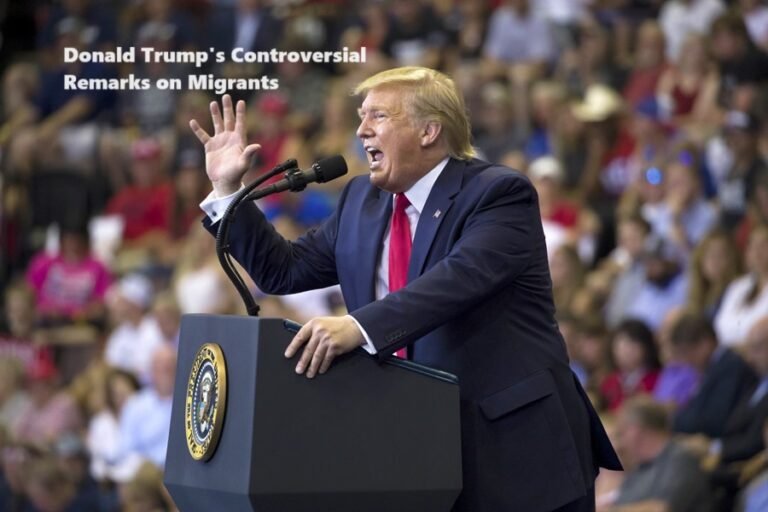Introduction
In a recent rally in Iowa, former US President Donald Trump made headlines once again with his inflammatory comments about migrants. Defending his previous remarks on “poisoning the blood,” these statements have sparked widespread outrage and concern. Such rhetoric not only perpetuates harmful stereotypes but also fuels division and xenophobia within society. This article delves into the consequences of such dangerous language and emphasizes the need for responsible leadership.
The Impact of Inflammatory Language
Donald Trump’s comments regarding migrants have been consistently controversial throughout his political career. By using dehumanizing language, he taps into existing fears and prejudices present within certain segments of society. This type of rhetoric fosters an environment where discrimination against immigrants becomes normalized, leading to hostility and violence.
Furthermore, when a figure as influential as a former president makes such statements, it has far-reaching consequences beyond just speeches at rallies. It serves to validate extremist ideologies held by hate groups who may feel emboldened to act upon their discriminatory beliefs. The rise in hate crimes targeting minority communities is often linked to political leaders propagating divisive narratives about immigration.
Undermining Humanitarian Values
Trump’s comments not only undermine America’s founding principles as a nation built by immigrants but also disregard international obligations towards refugees fleeing persecution or seeking better opportunities in search of asylum. His words further serve to stigmatize entire communities based solely on their ethnicity or country of origin.
By portraying immigrants as criminals or threats to national security without any basis in reality, this kind of rhetoric erodes empathy and compassion towards those most vulnerable among us – individuals who often leave behind everything they know in search of safety and opportunity for themselves and their families.
Fanning Xenophobic Sentiments
One cannot underestimate the power that words hold over public perception; they shape attitudes, fuel biases, and influence policy decisions. When prominent leaders make sweeping generalizations and perpetuate negative stereotypes about migrants, it contributes to an “us versus them” mentality within society. This not only affects the treatment of immigrants but also impacts the broader fabric of social cohesion.
The danger lies in how these sentiments can manifest in discriminatory policies that target specific ethnic or religious groups. History has shown that such exclusionary measures have severe consequences, leading to human rights abuses and further marginalization.
Calls for Responsible Leadership
In a time when global challenges demand unity and collaboration, leaders bear a significant responsibility to foster understanding rather than division. Public figures should aim to bridge gaps between communities and promote inclusivity through their words and actions.
Responsible leadership requires recognizing the value that immigrants bring to society – culturally, economically, and socially. It means acknowledging the contributions they make as teachers, doctors, entrepreneurs, artists, scientists – all integral parts of vibrant societies around the world.
Conclusion
Donald Trump’s recent defense of his controversial remarks on migrants once again highlights the divisive nature of his leadership style. By using inflammatory language at rallies or through other platforms during his tenure as president, he has perpetuated harmful stereotypes about immigrants while undermining America’s core values as a nation built by diverse populations seeking better lives.
It is imperative for responsible citizens and leaders alike to denounce such rhetoric whenever it surfaces. Engaging in open dialogue about immigration issues can help reshape public perception towards empathy and understanding rather than fear-based narratives. Only by working together can we build societies that celebrate diversity while upholding justice and human rights for all individuals regardless of their origin or status.
Read More:
20VC: The Podcast Shaping the Future of Venture Capital
The Power and Responsibility of Filmmakers: Examining “dpbossreal.com: The Kerala Story”
Box Office Clash: Shah Rukh Khan’s ‘Dunki’ Triumphs over Prabhas’ ‘Salaar’

